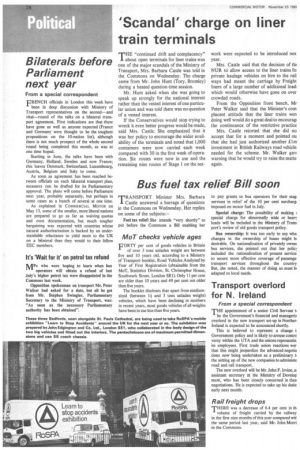'Scandal' charge on liner train terminals
Page 30

If you've noticed an error in this article please click here to report it so we can fix it.
rr HE "continued drift and complacency" about open terminals for liner trains was one of the major scandals of the Ministry of Transport, Mrs. Barbara Castle was told in the Commons on Wednesday. The charge came from Mr. John Hunt (Tory, Bromley) during a heated question-time session.
Mr. Hunt asked when she was going to speak up strongly for the national interest rather than the vested interest of one particular union and was told there was no question of a vested interest.
If the Conservatives would stop trying to wreck it even better progress would be made, said Mrs. Castle. She emphasized that it was her policy to encourage the wider availability of the terminals and noted that 1,000 containers were now carried each week compared with 30 in the first week of-operation. Six routes were now in use and the remaining nine routes of Stage 1 on the net work were expected to be introduced nex year.
Mrs. Castle said that the decision of tin NUR to allow access to the liner trains fa private haulage vehicles on hire to the rail ways had meant the carriage by Freight liners of a large number of additional load, which would otherwise have gone on over crowded roads.
From the Opposition front bench, Mr Peter Walker said that the Minister's corn placent attitude that the liner trains wen doing well would do a great deal to encourag the continuance of the restrictive practice Mrs. Castle retorted that she did no accept that for a moment and pointed on that she had just authorized another Elm investment in British Railways road vehicle needed for the scheme. Mr. Walker gav warning that he would try to raise the matte again.












































































































